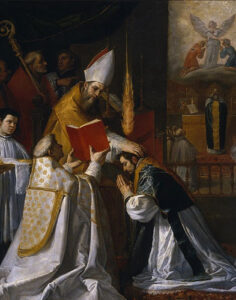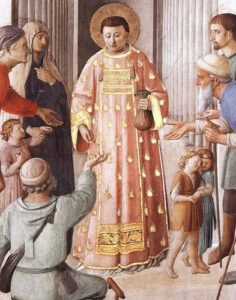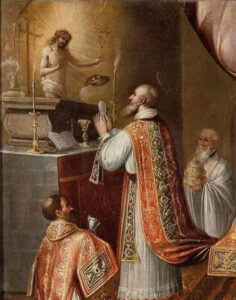Tuesday, Second Week of Lent
Saint Catherine of Siena says that humility flows from self-knowledge, and when we think about this, it’s easy to see why. Self-knowledge means considering ourselves as we truly are before God. Everything good that we have or that we can do, comes from Him. Everything good is on loan from Him; of ourselves, we can do nothing good. No matter what office we hold, what talents we have, it’s all a gift. However, this humility, this recognition of our littleness and our need for God’s constant care and assistance, is also our greatest source of strength and comfort.
“I had wondered for a long time why . . . all souls did not receive an equal amount of grace. . . . Jesus saw fit to enlighten me about this mystery. He set the book of nature before me and I saw that all the flowers He has created are lovely. The splendor of the rose and whiteness of the lily do not rob the little violet of its scent nor the daisy of its simple charm. I realized that if every tiny flower wanted to be a rose, spring would lose its loveliness and there would be no wild flowers to make the meadows bright.
It is just the same in the world of souls — which is the garden of Jesus. He has created the great saints who are like the lilies and the roses, but He has also created much lesser saints and they must be content to be the daisies or the violets which rejoice His eyes whenever He glances down. Perfection consists in doing His will, in being that which He wants us to be.
I also understood that God’s love shows itself just as well in the simplest soul which puts up no resistance to His grace as it does in the loftiest soul. Indeed, as it is love’s nature to humble itself, if all souls were like those of the holy doctors who have illumined the Church with the light of their doctrine, it seems that God would not have stooped low enough by entering their hearts. But God has created the baby who knows nothing and can utter only feeble cries. He has created the poor savage with no guide but natural law, and it is to their hearts that He deigns to stoop. They are His wild flowers whose homeliness delights Him. By stooping down to them, He manifests His infinite grandeur. The sun shines equally both on cedars and on every tiny flower. In just the same way God looks after every soul as if it had no equal. All is planned for the good of every soul, exactly as the seasons are so arranged that the humblest daisy blossoms at the appointed time.”
Today, and throughout the Lenten season, we can take some time to examine ourselves, asking God to shed His light so that we might be able to see those areas where we lack humility, and ask God to make us humble. Let us ask for the grace, through the intercession of Mary, Our Lady of Humility and Our Lady of Sorrows, for the grace of true conversion, to really become humble as she was.







